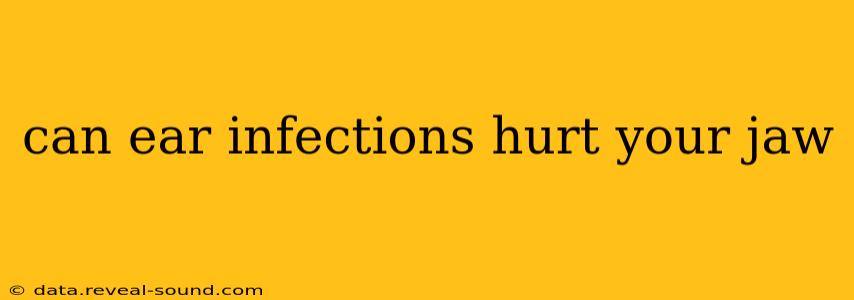Can Ear Infections Hurt Your Jaw? Understanding the Connection
Ear infections, while primarily affecting the ear, can sometimes cause referred pain that radiates to other areas of the face and head, including the jaw. This isn't a direct impact on the jaw joint itself, but rather a symptom stemming from the nerve pathways and the intricate connections within the head. This article explores the potential link between ear infections and jaw pain, addressing common questions and concerns.
What causes referred pain from an ear infection?
Referred pain occurs when pain originating in one part of the body is felt in a different, seemingly unrelated area. In the case of ear infections, the trigeminal nerve plays a crucial role. This nerve is responsible for sensation in the face, including the jaw, and also receives sensory input from the middle ear. When the middle ear is inflamed (as in an ear infection), the trigeminal nerve can misinterpret the pain signals, leading to discomfort felt in the jaw. This can manifest as a dull ache, sharp pain, or even a feeling of pressure or tightness in the jaw. The intensity of the referred pain can vary depending on the severity of the infection and individual sensitivity.
Can an ear infection cause jaw pain and stiffness?
Yes, an ear infection can potentially cause jaw pain and stiffness. The inflammation and pressure from the infection can affect the muscles surrounding the jaw joint (temporomandibular joint or TMJ). This can lead to restricted jaw movement, making it difficult to open or close the mouth fully, or causing clicking or popping sounds during jaw movement. This is particularly likely if the infection is severe or involves the surrounding tissues. It is important to note that jaw pain and stiffness can also have other causes, so it's crucial to consult a healthcare professional for proper diagnosis.
How long does jaw pain from an ear infection usually last?
The duration of jaw pain related to an ear infection depends primarily on the severity and duration of the infection itself. Once the infection is treated and resolves, the referred pain should subside. This usually happens within a few days to a couple of weeks following successful treatment of the underlying ear infection with antibiotics or other appropriate medical intervention. If the jaw pain persists beyond the resolution of the ear infection, it is advisable to seek medical attention to rule out other potential causes.
Is jaw pain a common symptom of an ear infection?
While not universally experienced, jaw pain is a relatively common symptom associated with ear infections, particularly middle ear infections (otitis media). Many individuals experience pain directly within the ear itself, but the referred pain can sometimes be the predominant or even sole symptom. The extent to which jaw pain is experienced can vary significantly depending on the individual and the specifics of the infection.
What should I do if I have jaw pain along with an ear infection?
If you are experiencing jaw pain alongside an ear infection, it's crucial to consult a healthcare professional. They can properly diagnose the ear infection and determine if the jaw pain is indeed related to it or if another condition is present. Self-treating can be risky, and a proper diagnosis ensures you receive appropriate treatment for both the ear infection and any associated jaw pain. Your doctor may prescribe antibiotics, pain relievers, or other treatments to address both symptoms. Do not attempt to treat this yourself or rely solely on over-the-counter remedies without professional guidance.
When should I seek immediate medical attention for jaw pain and an ear infection?
Seek immediate medical attention if you experience:
- Severe jaw pain
- Inability to open your mouth
- Swelling in the jaw area
- Fever
- Dizziness
- Severe ear pain
- Pus or drainage from the ear
These symptoms may indicate a more serious condition that requires prompt medical intervention.
Disclaimer: This information is for educational purposes only and should not be considered medical advice. Always consult with a healthcare professional for any health concerns or before making any decisions related to your health or treatment.
